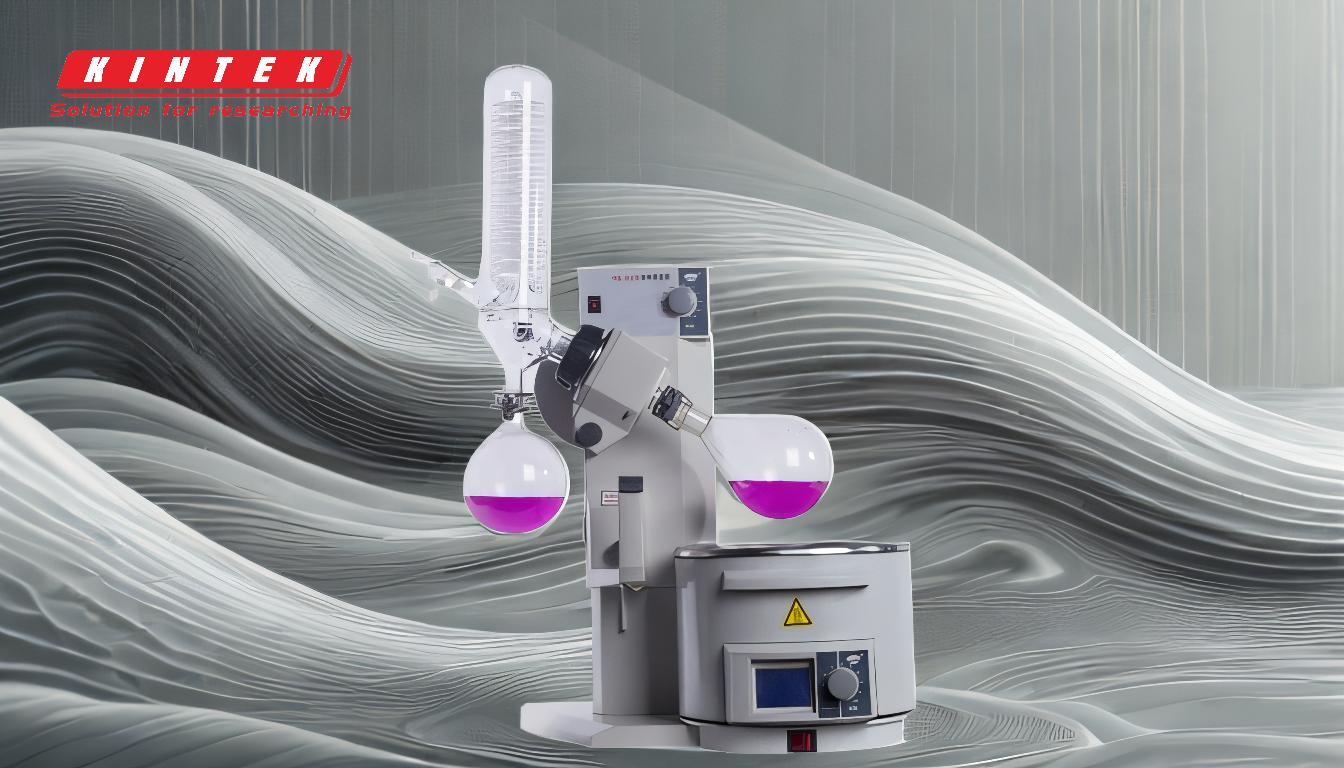Rotary evaporators, or "rotovaps," are essential tools in both laboratory and industrial settings due to their ability to efficiently remove solvents from samples under reduced pressure and controlled temperatures. This process prevents thermal degradation, oxidation, and other unwanted side reactions, making it ideal for handling heat-sensitive materials. By rotating the flask, the device creates a thin film of the sample, maximizing the evaporation surface area and significantly speeding up the process. Rotary evaporators are widely used in applications such as solvent removal, distillation, chemical synthesis, and extraction, particularly in industries like pharmaceuticals, biotechnology, and food science. Their ability to handle large volumes of solvent quickly and safely underscores their importance in modern scientific and industrial workflows.
Key Points Explained:

-
Efficient Solvent Removal:
- Rotary evaporators excel at removing solvents, especially those with high boiling points, by operating under reduced pressure. This lowers the boiling point of the solvent, allowing it to evaporate at lower temperatures. This is crucial for preventing thermal degradation, oxidation, or decomposition of heat-sensitive compounds.
- Example: Removing ether, which would take hours under atmospheric pressure, can be reduced to approximately 20 minutes using a rotovap.
-
Increased Evaporation Efficiency:
- The rotation of the flask creates a thin film of the sample on the flask walls, significantly increasing the surface area available for evaporation. This accelerates the process compared to traditional methods.
- The solvent vapor is rapidly condensed by a high-efficiency condenser, ensuring efficient collection and separation of the solvent from the sample.
-
Versatility in Applications:
- Rotary evaporators are widely used in laboratories for tasks such as:
- Fast distillation of mixed solvents.
- Efficient drying of samples.
- Preparation for freeze-drying.
- Chemical synthesis under reflux.
- Extraction of natural compounds (e.g., essential oils, cannabinoids).
- Concentration of solutions.
- Industrial applications include:
- Crude oil processing.
- Molecular cooking and flavor/fragrance creation.
- Cannabinoid separation in the cannabis industry.
- Rotary evaporators are widely used in laboratories for tasks such as:
-
Preservation of Product Integrity:
- By operating at lower temperatures, rotary evaporators minimize the risk of damaging heat-sensitive materials, ensuring the integrity of the final product. This is particularly important in pharmaceuticals and biotechnology, where maintaining the stability of compounds is critical.
-
Handling Large Volumes:
- Rotary evaporators are capable of processing large volumes of solvent efficiently, making them indispensable in high-throughput environments. This capability is especially valuable in industries like pharmaceuticals, where large-scale production is common.
-
Time and Cost Savings:
- The speed and efficiency of rotary evaporators reduce processing times significantly, leading to cost savings in both time and energy. For example, the distillation of ether can be reduced from hours to minutes, enhancing productivity.
-
Contribution to Scientific Advancements:
- Rotary evaporators play a critical role in research and development across various fields, including pharmaceuticals, chemicals, and biotechnology. Their ability to reliably distill solvents from sample solutions supports modern scientific discoveries and innovations.
-
Industrial Relevance:
- Beyond laboratories, rotary evaporators are used in industries such as food science (flavor and fragrance creation), cannabis (cannabinoid separation), and petrochemicals (crude oil processing). Their adaptability to diverse applications highlights their importance in industrial workflows.
In summary, rotary evaporators are indispensable tools that combine efficiency, versatility, and safety, making them critical for both laboratory research and industrial processes. Their ability to handle heat-sensitive materials, process large volumes, and save time and costs ensures their continued relevance in advancing scientific and industrial applications.
Summary Table:
| Key Benefits | Details |
|---|---|
| Efficient Solvent Removal | Operates under reduced pressure, lowering boiling points for heat-sensitive materials. |
| Increased Evaporation | Rotating flask creates a thin film, maximizing surface area for faster evaporation. |
| Versatility | Used in distillation, chemical synthesis, extraction, and industrial applications. |
| Product Integrity | Low-temperature operation preserves heat-sensitive materials. |
| Large Volume Handling | Processes large solvent volumes efficiently, ideal for high-throughput workflows. |
| Time and Cost Savings | Reduces processing times significantly, saving energy and resources. |
| Scientific Advancements | Supports R&D in pharmaceuticals, biotechnology, and chemical industries. |
| Industrial Relevance | Used in food science, cannabis, and petrochemicals for diverse applications. |
Ready to enhance your lab or industrial workflow? Contact us today to find the perfect rotary evaporator for your needs!













